#November is all about 'in this economy???'
Text

More Calendar Lore
November is a downer in Lance's dictionary. He decides to do something crazy - buy a house, sell the car, start a business, enroll in a course, something along the lines. He ends up dragging Keith out to dance in the rain. ”It's gonna be a house,” Lance declares. “Hmmm, I think we’d need that business first and it better be good,” Keith corrects. They look up options for all of these, dreaming and planning through the shitty weather and shittier economics, and after calling a few friends and making sure they can make it - they decide to adopt a kitty instead.
#klance#lance mcclain#keith kogane#klance fanart#voltron lance#voltron keith#November is all about 'in this economy???'#i hope your week will be amazing btw!!#stay happy okay but like in a searching for a spark of motivation kinda way#stay hopeful kinda stay happy#wishing everything besttt
869 notes
·
View notes
Text
"Hey, buddy, you've been hogging the Supercharger® long enough," emits the carrier signal of a Tesla owner. They're right to be upset. Ever since they opened up their fancy DC fast chargers to every Tom, Dick, and Ford owner, what was once a hoity-toity elite parking lot full of American-made economy cars is now full of a bunch of weird shitbags trying to fill up their batteries.
My electric car? Pretty much the same as yours: a 1974 Plymouth Fury III, with the original smog-coughing low-compression 400-cubic-inch V8 engine replaced with nearly a metric ton of golf-cart batteries I borrowed from the local country club. Hey, they weren't using any of them in the middle of November when I cut through the fence. Not to mention it's unethical for anyone to hoard valuable resources that could be used to reduce emissions, such as I am doing (unless you count the fact that this vehicle is still, somehow, leaking 10w40 motor oil from somewhere.)
The system isn't perfect. For instance, the "fast charge" system is not particularly fast. This is because it's an old Canadian Tire 12-volt boat battery maintainer that I've riveted onto the hood, and tricked the Tesla system into talking to. As far as the computer inside it knows, it's just a really stupid SUV. Before you blame me for being a charge hog, you must also know this: it is keeping my decrepit Galaxy Note smartphone alive, which hasn't had a working battery in it since that whole airplane fire snafu. And in turn, that phone is playing an educational podcast, about climate destroyers. This, I believe, is what the Tesla owner is actually angry about, and not the fact that I have been "fast charging" for the last seventeen hours using a stolen credit card.
I ignore him. I have long ago learned that pedestrians talk a lot of shit, but are generally afraid to actually damage my car: an emergency tetanus shot, after all, is unpleasant and can cost upwards of $25. Walking back inside the donut store at which I am "parked," I ask the attendant to refill my bottomless coffee once more. Maybe I'll live here, I think. I don't want to go anywhere more than about five miles away from this charger from now on.
919 notes
·
View notes
Text
Insurance companies are making climate risk worse
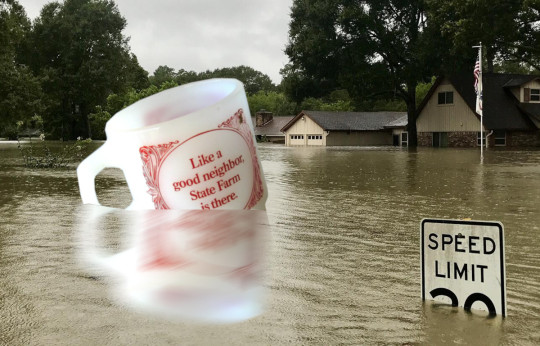
Tomorrow (November 29), I'm at NYC's Strand Books with my novel The Lost Cause, a solarpunk tale of hope and danger that Rebecca Solnit called "completely delightful."

Conservatives may deride the "reality-based community" as a drag on progress and commercial expansion, but even the most noxious pump-and-dump capitalism is supposed to remain tethered to reality by two unbreakable fetters: auditing and insurance:
https://en.wikipedia.org/wiki/Reality-based_community
No matter how much you value profit over ethics or human thriving, you still need honest books – even if you never show those books to the taxman or the marks. Even an outright scammer needs to know what's coming in and what's going out so they don't get caught in a liquidity trap (that is, "broke"), or overleveraged ("broke," again) exposed to market changes (you guessed it: "broke").
Unfortunately for capitalism, auditing is on its deathbed. The market is sewn up by the wildly corrupt and conflicted Big Four accounting firms that are the very definition of too big to fail/too big to jail. They keep cooking books on behalf of management to the detriment of investors. These double-entry fabrications conceal rot in giant, structurally important firms until they implode spectacularly and suddenly, leaving workers, suppliers, customers and investors in a state of utter higgeldy-piggeldy:
https://pluralistic.net/2022/11/29/great-andersens-ghost/#mene-mene-bezzle
In helping corporations defraud institutional investors, auditors are facilitating mass scale millionaire-on-billionaire violence, and while that may seem like the kind of fight where you're happy to see either party lose, there are inevitably a lot of noncombatants in the blast radius. Since the Enron collapse, the entire accounting sector has turned to quicksand, which is a big deal, given that it's what industrial capitalism's foundations are anchored to. There's a reason my last novel was a thriller about forensic accounting and Big Tech:
https://us.macmillan.com/books/9781250865847/red-team-blues
But accounting isn't the only bedrock that's been reduced to slurry here in capitalism's end-times. The insurance sector is meant to be an unshakably rational enterprise, imposing discipline on the rest of the economy. Sure, your company can do something stupid and reckless, but the insurance bill will be stonking, sufficient to consume the expected additional profits.
But the crash of 2008 made it clear that the largest insurance companies in the world were capable of the same wishful thinking, motivated reasoning, and short-termism that they were supposed to prevent in every other business. Without AIG – one of the largest insurers in the world – there would have been no Great Financial Crisis. The company knowingly underwrote hundreds of billions of dollars in junk bonds dressed up as AAA debt, and required a $180b bailout.
Still, many of us have nursed an ember of hope that the insurance sector would spur Big Finance and its pocket governments into taking the climate emergency seriously. When rising seas and wildfires and zoonotic plagues and famines and rolling refugee crises make cities, businesses, and homes uninsurable risks, then insurers will stop writing policies and the doom will become undeniable. Money talks, bullshit walks.
But while insurers have begun to withdraw from the most climate-endangered places (or crank up premiums), the net effect is to decrease climate resilience and increase risk, creating a "climate risk doom loop" that Advait Arun lays out brilliantly for Phenomenal World:
https://www.phenomenalworld.org/analysis/the-doom-loop/
Part of the problem is political: as people move into high-risk areas (flood-prone coastal cities, fire-threatened urban-wildlife interfaces), politicians are pulling out all the stops to keep insurers from disinvesting in these high-risk zones. They're loosening insurance regs, subsidizing policies, and imposing "disaster risk fees" on everyone in the region.
But the insurance companies themselves are simply not responding aggressively enough to the rising risk. Climate risk is correlated, after all: when everyone in a region is at flood risk, then everyone will be making a claim on the insurance company when the waters come. The insurance trick of spreading risk only works if the risks to everyone in that spread aren't correlated.
Perversely, insurance companies are heavily invested in fossil fuel companies, these being reliable money-spinners where an insurer can park and grow your premiums, on the assumption that most of the people in the risk pool won't file claims at the same time. But those same fossil-fuel assets produce the very correlated risk that could bring down the whole system.
The system is in trouble. US claims from "natural disasters" are topping $100b/year – up from $4.6b in 2000. Home insurance premiums are up (21%!), but it's not enough, especially in drowning Florida and Texas (which is also both roasting and freezing):
https://grist.org/economics/as-climate-risks-mount-the-insurance-safety-net-is-collapsing/
Insurers who put premiums up to cover this new risk run into a paradox: the higher premiums get, the more risk-tolerant customers get. When flood insurance is cheap, lots of homeowners will stump up for it and create a big, uncorrelated risk-pool. When premiums skyrocket, the only people who buy flood policies are homeowners who are dead certain their house is gonna get flooded out and soon. Now you have a risk pool consisting solely of highly correlated, high risk homes. The technical term for this in the insurance trade is: "bad."
But it gets worse: people who decide not to buy policies as prices go up may be doing their own "motivated reasoning" and "mispricing their risk." That is, they may decide, "If I can't afford to move, and I can't afford to sell my house because it's in a flood-zone, and I can't afford insurance, I guess that means I'm going to live here and be uninsured and hope for the best."
This is also bad. The amount of uninsured losses from US climate disaster "dwarfs" insured losses:
https://www.reuters.com/business/environment/hurricanes-floods-bring-120-billion-insurance-losses-2022-2023-01-09/
Here's the doom-loop in a nutshell:
As carbon emissions continue to accumulate, more people are put at risk of climate disaster, while the damages from those disasters intensifies. Vulnerability will drive disinvestment, which in turn exacerbates vulnerability.
Also: the browner and poorer you are, the worse you have it: you are impacted "first and worst":
https://www.climaterealityproject.org/frontline-fenceline-communities
As Arun writes, "Tinkering with insurance markets will not solve their real issues—we must patch the gaping holes in the financial system itself." We have to end the loop that sees the poorest places least insured, and the loss of insurance leading to abandonment by people with money and agency, which zeroes out the budget for climate remediation and resiliency where it is most needed.
The insurance sector is part of the finance industry, and it is disinvesting in climate-endagered places and instead doubling down on its bets on fossil fuels. We can't rely on the insurance sector to discipline other industries by generating "price signals" about the true underlying climate risk. And insurance doesn't just invest in fossil fuels – they're also a major buyer of municipal and state bonds, which means they're part of the "bond vigilante" investors whose decisions constrain the ability of cities to raise and spend money for climate remediation.
When American cities, territories and regions can't float bonds, they historically get taken over and handed to an unelected "control board" who represents distant creditors, not citizens. This is especially true when the people who live in those places are Black or brown – think Puerto Rico or Detroit or Flint. These control board administrators make creditors whole by tearing the people apart.
This is the real doom loop: insurers pull out of poor places threatened by climate disasters. They invest in the fossil fuels that worsen those disasters. They join with bond vigilantes to force disinvestment from infrastructure maintenance and resiliency in those places. Then, the next climate disaster creates more uninsured losses. Lather, rinse, repeat.
Finance and insurance are betting heavily on climate risk modeling – not to avert this crisis, but to ensure that their finances remain intact though it. What's more, it won't work. As climate effects get bigger, they get less predictable – and harder to avoid. The point of insurance is spreading risk, not reducing it. We shouldn't and can't rely on insurance creating price-signals to reduce our climate risk.
But the climate doom-loop can be put in reverse – not by market spending, but by public spending. As Arun writes, we need to create "a global investment architecture that is safe for spending":
https://tanjasail.wordpress.com/2023/10/06/a-world-safe-for-spending/
Public investment in emissions reduction and resiliency can offset climate risk, by reducing future global warming and by making places better prepared to endure the weather and other events that are locked in by past emissions. A just transition will "loosen liquidity constraints on investment in communities made vulnerable by the financial system."
Austerity is a bad investment strategy. Failure to maintain and improve infrastructure doesn't just shift costs into the future, it increases those costs far in excess of any rational discount based on the time value of money. Public institutions should discipline markets, not the other way around. Don't give Wall Street a veto over our climate spending. A National Investment Authority could subordinate markets to human thriving:
https://democracyjournal.org/arguments/industrial-policy-requires-public-not-just-private-equity/
Insurance need not be pitted against human survival. Saving the cities and regions whose bonds are held by insurance companies is good for those companies: "Breaking the climate risk doom loop is the best disaster insurance policy money can buy."
I found Arun's work to be especially bracing because of the book I'm touring now, The Lost Cause, a solarpunk novel set in a world in which vast public investment is being made to address the climate emergency that is everywhere and all at once:
https://us.macmillan.com/books/9781250865939/the-lost-cause
There is something profoundly hopeful about the belief that we can do something about these foreseeable disasters – rather than remaining frozen in place until the disaster is upon us and it's too late. As Rebecca Solnit says, inhabiting this place in your imagination is "Completely delightful. Neither utopian nor dystopian, it portrays life in SoCal in a future woven from our successes (Green New Deal!), failures (climate chaos anyway), and unresolved conflicts (old MAGA dudes). I loved it."

If you'd like an essay-formatted version of this post to read or share, here's a link to it on pluralistic.net, my surveillance-free, ad-free, tracker-free blog:
https://pluralistic.net/2023/11/28/re-re-reinsurance/#useless-price-signals
#pluralistic#doom loop#insurance#insuretech#climate#climate risk#climate emergency#the lost cause#market forces#risk management#price signals#control boards#decarbonization#bond vigilantes#climate resilience
262 notes
·
View notes
Text
🚨 EMERGENCY COMMISSIONS OPEN🚨 tw // homeless / some med talk but not much
Reblogs are greatly appreciated!!

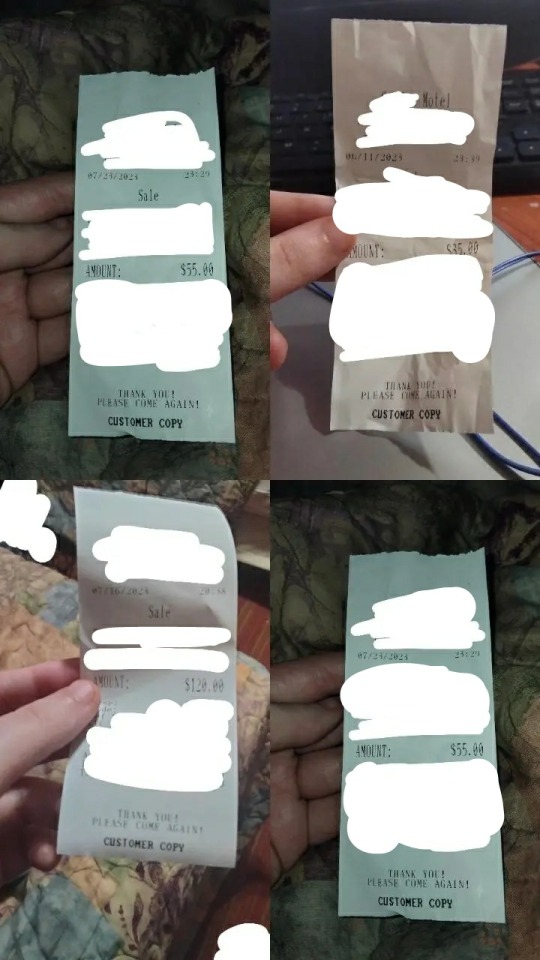
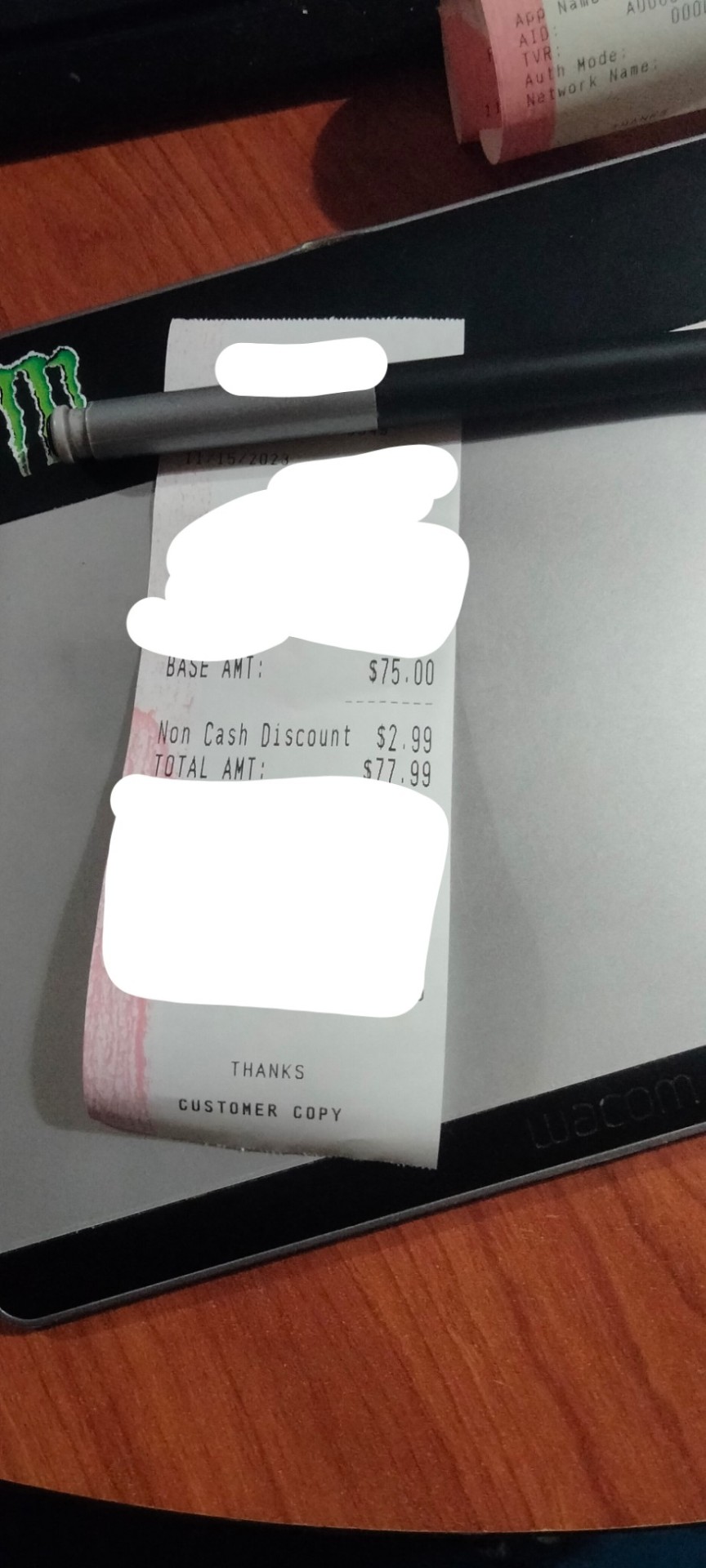
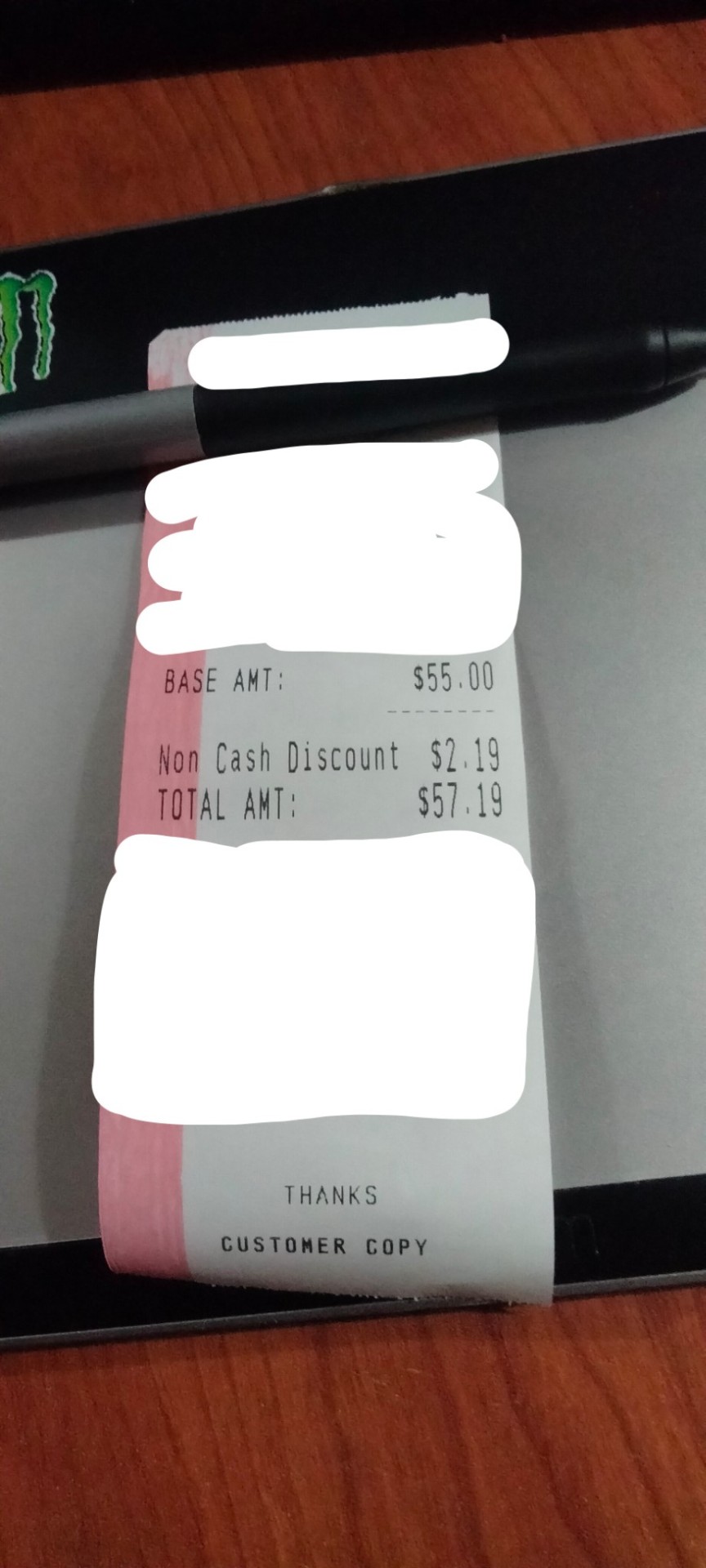
Making a new post to hopefully get some work for my family and I so we have somewhere to stay for tonight, since work has been very slow lately. I'm Link, and I'm a 22-year old artist, and my family and I (me + my father and younger sibling) have been homeless since November 2021. It's a long story. TL;DR version is at the same time, while I was living with a friend and my dad + younger sibling was on the road (he drove a van at the time) he had gotten into a diabetic coma and was fired by his job. Being fired meant he or my sibling didn't exactly have a home to go back to, as our relatives on both sides refused to help. At the same time, I was going to have to find someplace else since my friends grandmother was entering the late stages of her life and they had to transfer her to the nursery, meaning there was a lot of things his family had to take care of and I couldn't be there. They allowed my father, sibling and I to stay there for two weeks to give us time to find someplace else.
While I was there, I'd been doing commissions to help their family out with food, and since it was either the streets or living under a roof; I told my friend to take us to a nearby motel since we had enough for a day, and we could figure things out from there. So since then, I've been keeping us here by doing commissions ever since. Either of us haven't been able to obtain a job yet due to how hard it is for us to get our documents to get an id (we dont have a car at the moment, and saving money for the room and food is already tough as is), but recently we think we might be able to get my father's ID so he can work, were waiting on his lung condition to recover fully and get money saved up for the documents and all that before we apply to get them. So hope isn't fully lost for us, we just need to take care of some things for a while longer until then.
Recently, things have gotten worse again. We were paying weekly thanks to the help from my followers and commissions I was getting, but when we weren't able to pay for another, we went back to paying daily again. And immediately we were set back. For the past few days, we haven't been able to pay for one let alone food. We were able to pay most of it to at least stay here, thanks to the kindness of the staff, but they called us earlier to tell us if we couldn't pay everything tonight, then we'd have to leave. We owe 120 by 11pm tonight, and I thought maybe making a new post might help us since posting on my other socials hasn't done much for us lately.
My commissions are open, and if you're interested in helping us out via a commission you can contact me through my Tumblr dms since it's the easiest way to get to me. But if you can't help financially, which I totally understand, I know the economy is tough on all of us right now, please don't feel bad or anything. Reblogs also help us a ton, and it always means a lot to us.
For the commission info itself, I have it all packed into this link right here, along with examples of my art and prices. I draw mainly fantasy pertaining to the Dragon Age Series and although I know little to nothing about Baulders Gate, I have done some art of tavs before! I also do DnD work as well, so I'm used to drawing pretty unique characters. I'll also put some examples I have below. If you want something outside of that, I'm sure I can provide, just let me know upon your request! And I think that's all. Much love to you and thank you for reading, I hope you have a wonderful day/night :)





#emergency aid#mutual aid#financial aid#aid#signal post#signal b00st#signal boosting#signal boost#boosting#b00st#artistsupport#artists on tumblr#dragon age#mass effect#emergency commissions#emergency art commissions#emergency#art commission info#open art commissions#digital painting#open commissions#ttrpg commissions#ttrpg art#dnd commission#dungeons and dragons#dnd campaign#homeless#clip studio art#digital artist#queer artist
137 notes
·
View notes
Note
do you think there's a considerable amount of (young) people refusing to vote for biden because of i/p, or do you think theyre just a loud minority? i cant really tell, myself
I have been keeping a fairly close eye on polls (at least the good high-quality large-sample ones, not the numerous trash ones which currently flood the sphere), actual voting results, and other empirical data that relies on non-social-media blathering. And while we will still need more data and see if anything changes, at this point I think we can presume that any electoral effect of the I/P situation is already baked into Biden's expected results and performances, and I honestly don't think there's much, if any, of a measurable effect.
I say this because first of all, one of the most recent high-quality, large-sample youth polls (I think it was YouGov, but I can't be sure) had precisely 0% of voters between 18-29 listing foreign policy as their top priority in 2024. There were other expected priorities: the environment, the economy, American democracy, abortion rights, LGBTQ+ rights, etc -- but not foreign policy. Now, caveat emptor about this being only the people who respond to polls, the fact that most polls have been largely junk this primary cycle (notably, they have way overestimated Trump's performance and way underestimated Biden's), and so forth. However, even in libertarian New Hampshire, which tends to wander more than the other solidly-blue presidential election New England states (as a number of them still have Republican governors), "ceasefire" only garnered 1% of all write-in votes, and Biden won commandingly despite not being on the ballot. In South Carolina, he just won 97% statewide, and even the Democrats who skipped the primary due to it not being particularly interesting or competitive (as compared to the highly competitive open primary in 2020) still generally say that they plan to vote for Biden in November. So overall, Biden is doing even better at this point in the primary cycle than he was in 2020, where Sanders' early wins in Iowa and NH were generating chatter about an upset. Once again, this is early and we are working with a limited sample size, but despite everything, I think we can posit that the "Democrats/Black people/Hispanics/young people won't vote for Biden because of xyz issue and therefore We Are All Doomed" thesis is at best, considerably overinflated and at worst, totally untrue.
Likewise, to be blunt: the loudest voices shouting about how they will never vote for Biden because of the Gaza situation either don't vote at all, only voted once in 2020 under extreme duress and haven't voted since, and otherwise aren't being taken into account either in polls (which are bad data because they are by nature experimental and speculative) or actual voting results (which reflect the way real people actually voted in elections). The reason the YouGov sample might not have pulled any voters between 18-29 listing foreign policy as their top priority very well could be because these people flat out don't vote and therefore won't pass any "likely" or "registered" voter screens, so despite all their yelling on social media, there's not been any actual impact. Now, this is not to say that there won't be; there has, for instance, been speculation that Biden might be hurt in states like Michigan, which have a large Arab-American population. Michigan is obviously one of the traditional Blue Firewall states that Hillary lost in 2016 and which Biden retook in 2020, and any electoral wobbling there would be ominous for his overall results. However, this is also reckoning without the fact that there is now a largish chunk of old-school GOP/independent voters who say they will not vote for Trump under any circumstances, with that number growing if he's explicitly convicted of a felony. Some of these voters might sit out, or vote for Biden, or maybe decide to vote for some stupid crackpot like RFK Jr., but the point is, if they do in fact not vote for Trump or even vote for Biden, that changes the electoral math.
Likewise: there are about 40,000 Arab-American voters in Michigan. Biden won the state by 154k votes, or 3.35%, in 2020. Even if every single one of those voters voted FOR Trump this time (which would be insane, but never mind), that alone would not be enough to flip the state from Biden, and that's reckoning without the votes that Trump will lose elsewhere. I've seen a few left-leaning publications such as the Guardian picking up the "will Biden's stance on Gaza hurt him in November" question, and the loud social media blabbermouths want to insist that it will because it makes them feel important, but at this point, I honestly don't see widespread electoral evidence of it, because, put bluntly: Democrats vote. Posturing social media "progressives" largely don't. Therefore for all the screaming they do, their views do not get incorporated into the actual results, which is a damn good thing for us.
So in short: No, as of right now, I don't think there is in fact a substantial anti-Biden protest vote, and the people threatening it the most were never going to vote for him anyway. This has gone on long enough that if it was going to flag up as a major thing, I think it would have. There will always be the idiots throwing away their vote on some stooge like Cornel West or Jill Stein (lol), but once again, these people were never going to vote for Biden in the first place and it is not necessarily the case that we need to put undue credence in their threats. Not that we can slack our vigilance, as we cannot and every single person who can vote blue in 2024 needs to fucking do so if they're interested in continuing to live in a democracy, but the situation is not apocalyptic, and yet again, the Online Leftists are far from the most reliable metric of how effective their screaming actually is. So, yeah.
131 notes
·
View notes
Text
Just so we are all really clear: Republicans are using the manufactured debt ceiling “crisis” as a bargaining chip, threatening to blow up the U.S. (and world?) economy unless Biden caves in to cutting things like food benefits for women, children, the poor and the working poor. Got it? That’s their deal—either eviscerate the social safety net, or economy go boom!
No doubt, a lot of liberals are pressuring Biden to acquiesce, because 1) the economy will absolutely positively go boom! and 2) because they will blame Biden if the economy crashes
BUT..! Here’s the thing: If Biden does cave in and give Republicans even a little bit of what they are demanding, I fuckn promise you that in October and November of next year, Republican ads are going to be like: “Vote for Trump! Remember how Biden cut food benefits for women and children? Trump won’t do that”
And it will not matter how many 8k high quality videos you have showing that it was really Republicans who took the economy hostage and demanded those cuts. By time the general election rolls around in ‘24, Republicans will be airing ChatGPT AI political ads where it looks like Biden was the one asking for all the cuts to SNAP and demanding ridiculously harder work requirements
Believe that!!
Did you even see those ignorant charlatans eating from Trump’s hands on CNN?? These are bomb throwers. They enjoy blowing up the economy, especially when it hurts poor people! You cannot in good faith make any policy decision about what to do based off of what Republican voters “might think” when it’s election time! They don’t “think” AT ALL, and even if they did, they still do not care! They’re unscrupulous deplorables. They will always always always find a way to blame Biden and the Democrats, no matter what, so Biden may as well go on and do what’s right while he can, and try actually fighting against these cartoonishly evil Republicans
AND..! Do I even need to remind anyone what happens when you cave in to bullies?? If Biden caves now, then Republicans will bully every Democrat from here on out, and the programs they take hostage next time will be Social Security, Medicare and Medicaid
Caving in to the whims of Kevin pickme! McCarthy and Marjorie Traitor Greene is bad politics, and it will only get worse in the future if Biden folds now
#politics#kevin mccarthy#joe biden#republicans#debt ceiling#bullies#odin rants#hostage negotiations 101#debt crisis#national debt#manufactured crisis#bullying
267 notes
·
View notes
Text

Last Push for Immigration
We're slated to leave at the end of November, and for everything we've managed to save, it's all going to travel expenses. We need help putting a down payment on somewhere to stay!
$455 / $3000
Kofi • Commissions • $ruckusthekid
I'm more than happy to work for it, and any help is appreciated. We're applying for asylum (where might be changing, Portugal resources are getting really slim), & our goal is to help other trans kids out of the country once we've figured out the process.
Thank you so so much for the support we've already received, and I'm honestly really excited to show y'all how it all goes down.
See ya soon!
More information about us, if you want it:
As a trans couple, my husband and I are really feeling the pressure to get out of the United States. We thought we could skim by where we are until we could leave, but he's been goaded by local police as they humiliated and condescended him in a back room for being trans, and I had my ID confiscated for saying male, and upon trying to get it reissued as female, I was kept after hours in the state trooper's office and surrounded by all residing cops left in the station as it was processed. We don't feel safe, if you can believe it.
We've flown by the seat of our pants a lot. We've been kicked out, homeless, manipulated and hurt by a lot of fucking people over the last five years, and we've always managed to make it work. I assume the same can be said for this; even if we don't get the money we need before we leave, we'll figure something out when we get there.
It's not ideal, having to do things like this, but we're in the middle of nowhere, in a food desert, and I have a highly restrictive diet that's really difficult to afford as it is. We've been trying to save for over a year now and only scraped up $2k with help. It's on par, if not over $1k each for us to fly, with our baggage & cats.
I'm doing my fuckin best and I'm willing to work for anything we make here, I'm just floundering to support us and get this together too with how absolutely shithole rancid the economy is.
No one owes us anything, there's no pressure to donate or commission me, but it would be an enormous pressure off of us to get this put together before we leave. Please.
#be mindful of what you tag this tumblr likes to kill dono posts#its so. embarrassing to have to do this but were disabled what else can we do#wait until the fake fictional fantasy time period where we suddenly have all of the money spoons and resources to move abroad?#i want to get a job as soon as were there and acclimated like im willing to do it but theres nowhere to work where we are right now#were in the middle of nowhere and everyone is already broke and trying to find work
157 notes
·
View notes
Text
Recent viral images of Southwest agents getting yelled at and crying have resurfaced a valuable lesson about the nature of our economic system that’s worth examining this holiday season: the deliberate, built-in ways corporate “customer service” is set up to not only shield those on the top of the ladder—executives, vice presidents, large shareholders—but pit low-wage workers against each other in an inherently antagonistic relationship marked by powerlessness and frustration. It’s a dynamic we discussed in “Episode 118: The Snitch Economy—How Rating Apps and Tipping Pit Working People Against Each Other,” of the Citations Needed podcast I co-host, but I feel ought to be expanded on in light of recent events. Watching video after video, reading tweet after tweet, describing frustrated stranded holiday travelers yelling at Southwest Airlines workers, and hearing, in turn, accounts of airline workers and airport staff breaking down crying, is a good opportunity to talk about how none of this is natural or inevitable. It is a choice, both in corporate policy and government regulation.
There are three main ways capital pits workers against each other in the relationship we call “customer service”:
1. Snitch economy. As discussed in Citations Needed Ep. 118, we are provided with more and more apps, websites, and customer surveys to effectively do the job of managing for management—free of charge, of course. Under the auspices of “empowering” the consumer, we are told to spy on our low-wage servants and gauge the quality of their servitude with stars, tips, and reviews. Uber, DoorDash, Fiver, Grubhub—a new “gig economy” has emerged that not only misclassifies workers as freelancers to pay them less, but hands over the reins of management to the consumer directly. This necessarily increases the antagonism between working-class consumers and the workers they are snitching on.
2. Automation. Increasingly, even getting to the bottom rung employee to yell at is difficult. Under the thin pretense of Covid, increased labor power has exploded the use of automated technology that creates a frustrating maze to get a simple problem solved or task accomplished. Don’t go to the register, instead download the app and order. Scan the QR code, don’t wait on hold, go to our website and engage a series of automated prompts and maybe you can solve your problem. More and more consumers are being pushed away from humans onto automated systems we are told will “save us time,” but instead exist solely to save the corporation labor costs. So, by the time the average consumer does finally work their way to seeing a human, they are annoyed, frustrated, and angry at this faceless entity and more willing to take it out on someone making $13 an hour.
One recent visit to Houston’s George H.W. Bush airport portended our obnoxious “automated” future. To cut down on unionized airport labor, all the restaurants use QR codes and require you to order food and drinks for yourself. Per usual, it’s sold as an exciting new technology that’s somehow good for consumers, but really the basic technology is 30 years old. It’s just a screen—the same ones restaurants have had for decades. The only thing that’s changed is the social conditioning of having you do all your own ordering and menu navigation. The waiter hasn’t been replaced by an iPad, they’ve been replaced by you. Invariably, it’s clunky and annoying and reduces the union jobs that airport construction is said to provide to justify soliciting public dollars. The only winner is a faceless corporation with a Delaware LLC and its shareholders living in a few counties in Connecticut and Texas.
Automation not only annoys and adds labor burdens to the customer, there is also evidence that it is a significant contributor to income inequality. A November 2022 study published in the journal Econometrica looked at the significantly widening income gap between lesser and more educated workers over the past 40 years. It found that “automation accounts for more than half of that increase,” as summarized by MIT News. “This single one variable … explains 50 to 70 percent of the changes or variation between group inequality from 1980 to about 2016,” said MIT economist Daron Acemoglu, co-author of the study. Whether or not, under a different economic system, automation could be a force for good is a debate for another day. But what is clear is that, while both consumers and workers are harmed by this trend, there is a significant want of solidarity between them.
3. Deliberate understaffing. This is a major culprit in this week’s Southwest Airlines meltdown. In parallel with the increased use of forced automation, cost-cutting corporations, facing increased labor power, are gutting staffing to its bare bones and hoping their corporate competitors doing the same will lead to a shift in consumer’s willingness to put up with substandard service and conditions, and overall bullshit. “We apologize for the wait,” the automated phone prompt tells us. Of course a machine cannot be contrite, so the effect is both surreal and grating: You’re not fucking sorry, you don’t exist. You're a recording. But now, who am I yelling at?
...
556 notes
·
View notes
Text
EARTH IS MISSING! / EVERYONE'S WORLD IS ENDING ALL THE TIME
this spring I entered the Elizabeth Soutar Bookbinding Competition held by the National Library of Scotland. The theme this year was climate change. I didn't win any of the categories (I certainly didn't think I'd win any of the Craft categories, but I thought I had a decent shot at the Creative categories) but I am very happy with how my binding came out anyway!
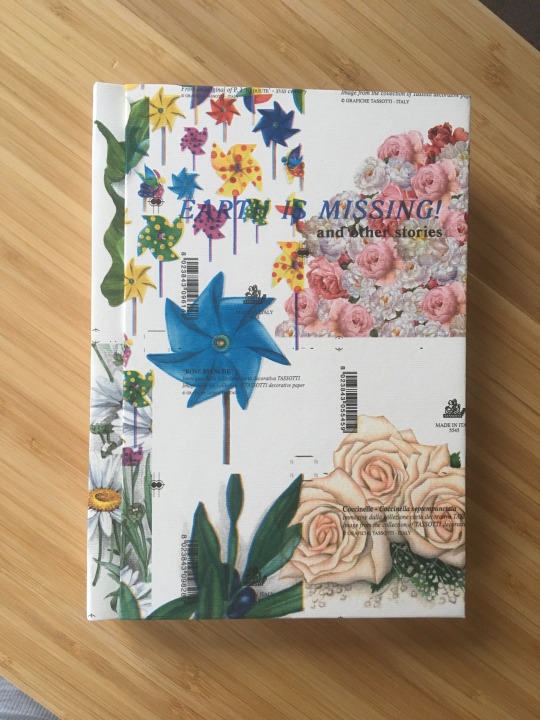



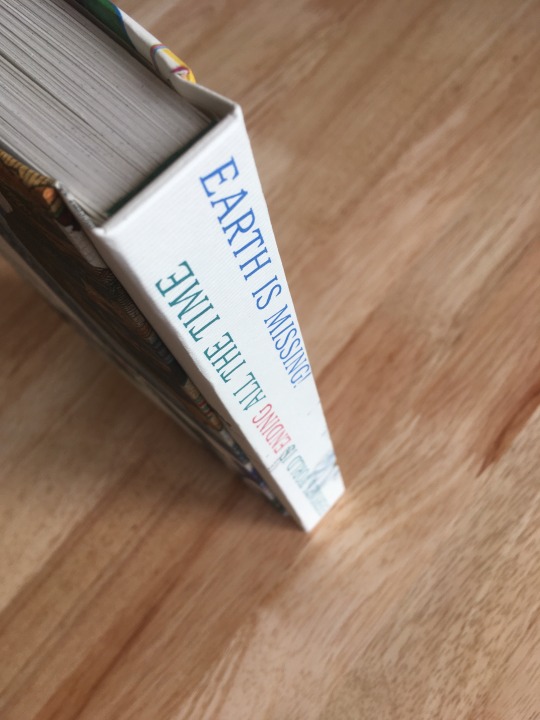

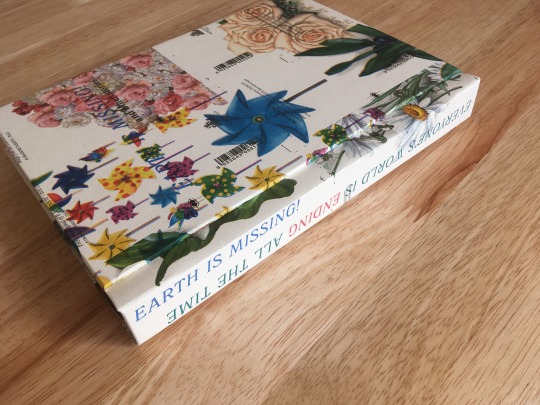

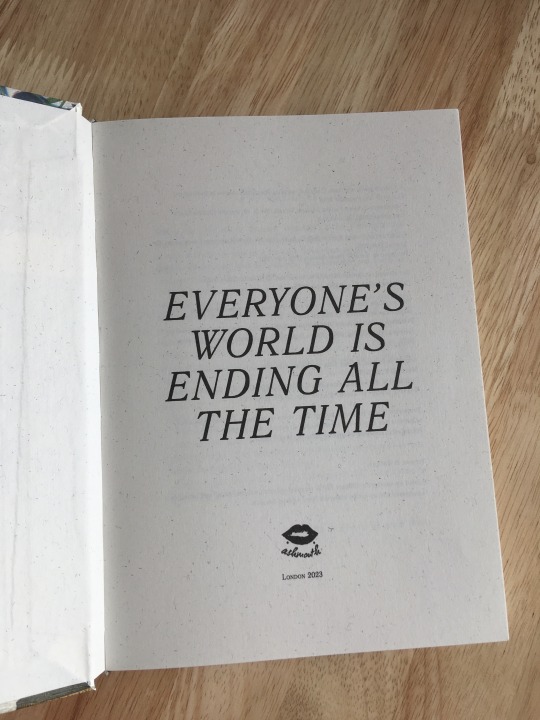



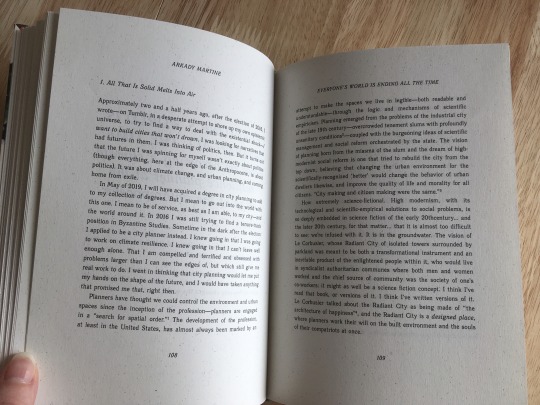
under the cut is the details of the binding and the process that went into it, plus a full list of the texts included.
this is a modified 3 piece bradel binding - a 3 piece bradel is usually made with leather spine with the spine attached to the textblock and the front and back covers added on after. there's another variety of a 3 piece bradel case where the spine and boards are assembled with a thin piece of paper to later be covered with a bookcloth. I wanted to use some leftover misprint cardstock I had (the same stuff I'd previously used to make paperbacks) and I wanted to print the titles directly onto the covers and spine (specifically I wanted to overprint the titles to imitate the existing misprint), and in order to fit it through my printer I had to have it in three pieces. so I assembled a bradel case as if it were to be covered with a cloth, only the cardstock I was using to assemble the case would also be the cover material.
everything I used to make this book was recycled or reused, with the exception of the greybeards which were new (I didn't have any rescued book boards from secondhand books at the time). the text paper is recycled eco-craft paper, the endbands are re-used macramé cords wrapped in green wrapping paper that came from a gift bag, and as mentioned, the cover material comes from a misprinted running sheet.
a few process photos of getting the case together:

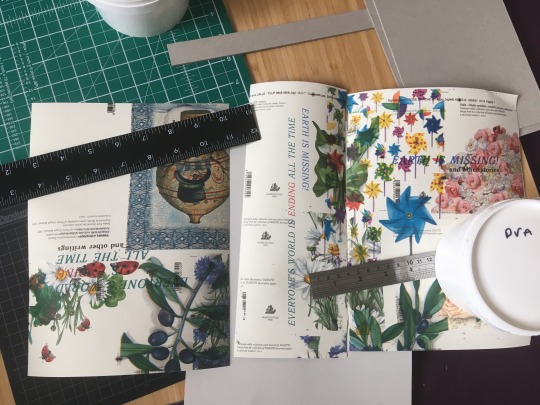






in terms of content, I took care that not only should the binding fit the theme of climate change - by using recycled and reused materials - but the text inside should also fit the theme. there were a lot of considerations there because I could easily have just bought a copy of something like Greta Thunberg's speeches and rebound them, but I wanted the texts to be something that made sense to me. so I went and looked at the SFF magazines I read for climate fiction and essays, I looked for academic papers, and I looked on Gutenberg for older pulp fiction relating to climate change. once I had a selection of texts I pared them down to two categories, fiction and non-fiction, and decided the most fun way to bind them would be as a tête-bêche with fiction on one side and non-fiction on the other, and this then informed how the binding would physically turn out - the modified 3 piece bradel.
here is the full table of contents for each side of the book:
EVERYONE'S WORLD IS ENDING ALL THE TIME and other writings
A Climate of Competition: Climate Change as Political Economy in Speculative Fiction, 1889–1915 by Steve Asselin Published in Science Fiction Studies, Vol. 45, No. 3, SF and the Climate Crisis (November 2018), pp. 440-453
A Century of Science Fiction That Changed How We Think About the Environment by Sherryl Vint Published in the MIT Press Reader, 20th July 2021
The climate is changing. Science fiction is too. by Eliza Levinson Published in The Story, 30th June 2022
’Not to escape the world but to join it’: responding to climate change with imagination not fantasy by Andrew Davison Published in Philosophical Transactions: Mathematical, Physical and Engineering Sciences, Vol. 375, No. 2095, Theme issue: Material demand reduction (13 June 2017), pp. 1-13
Science in Fiction: A Brief Look at Communicating Climate Change through the Novel by Eline D. Tabak Published in RCC Perspectives, No. 4, COMMUNICATING THE CLIMATE: From Knowing Change to Changing Knowledge (2019), pp. 97-104
Everyone’s World Is Ending All the Time: notes on becoming a climate resilience planner at the edge of the anthropocene by Arkady Martine Published in Uncanny Magazine issue 28, May 7, 2019
EARTH IS MISSING! and other stories
Earth Is Missing! by Carl Selwyn in Planet Stories (1947)
Climate—Disordered by Carter Sprague in Startling Stories (1948)
Climate—Incorporated by Wesley Long in Thrilling Wonder Stories (1948)
A Being Together Amongst Strangers by Arkady Martine in Uncanny Magazine (2020)
You’re Not The Only One by Octavia Cade in Clarkesworld Magazine (2022)
Why We Bury Our Dead At Sea by Tehnuka in Reckoning Magazine (2023)
#my binding#bookbinding#Elizabeth Soutar Bookbinding Competition#recycled materials#reused materials#climate fiction#climate action
161 notes
·
View notes
Text

NEW: Satellite imagery reviewed by HRW shows that orchards, greenhouses and farmland in northern Gaza have been razed since the beginning of Israel’s ground invasion, compounding concerns of dire food insecurity and loss of livelihood.
Israel's military has said in recent weeks it has conducted military operations in the Beit Hanoun area, including in an undisclosed agricultural area, to clear tunnels and other military targets.
The laws of war prohibit attacks directed at civilians or civilian objects, indiscriminate attacks and attacks that are disproportionate in the harm they cause to civilians. All parties to the conflict must take constant care to spare the civilian population.
In NE Gaza, north of Beit Hanoun, once-green agricultural land is now brown and desolate. Fields and orchards were first damaged during hostilities following Israel’s ground invasion in late Oct. Bulldozers carved new roads, clearing the way for Israeli military vehicles.
But since mid-November, after Israeli forces took control of the area, satellite imagery shows that orchards, fields and greenhouses have been systematically razed, leaving sand and dirt.
Farmers planted crops like citrus fruit, potatoes, dragon fruit and prickly pear in this area, some of which took years to grow, contributing to the livelihoods of Palestinians in Gaza. Some plots were razed in a day.
High resolution satellite imagery shows bulldozers were used to destroy fields and orchards. Tracks are visible, as well as mounds of earth on the edges of the former plots. Israeli forces have used armored bulldozers for years, including in the post Oct 7 offensive in Gaza.
As food systems collapse across Gaza, we are gravely concerned about the well-being of over 2 million Palestinians in Gaza who face hunger, food insecurity and loss of livelihood amid the Israeli blockade. The World Food Programme has warned of “the immediate possibility of starvation.”
Satellite imagery indicates that the razing of agricultural land continued in northern Gaza during the military pause in fighting that began on Nov 24. The Israeli military was in direct control of the area during that time, and remains so now.
Israeli forces destroyed agricultural land in Gaza in the past. HRW documented razing of fields, greenhouses and orchards by Israeli forces, including in 2004 and in 2009.
On Nov 28, the Palestinian Central Bureau of Statistics said Gaza is suffering at least $1.6 million daily loss in farm production. In addition to destroyed farmland, many farmers are displaced. Lack of aid + destruction of bakeries also contribute to dire food shortages.
The current crisis has further exacerbated the impact of Israel’s more than 16-year closure, which has devastated Gaza’s economy and left 80% of the population before Oct 7 reliant on aid.
Whether by deliberate razing, damage due to hostilities or the inability to irrigate or work the land, farmland across northern Gaza – which also included crops like tomatoes, cabbage and strawberries – has been drastically reduced since the start of the ground invasion.
World leaders should call on Israel to protect civilians. They should urgently act to prevent food insecurity, loss of livelihood and starvation of Palestinian men, women and children in Gaza.
#as greta thunberg said: there is no climate justice without human rights#palestine#gaza#free palestine
54 notes
·
View notes
Text
Well, I did a corny post last year after the last home game about how much I appreciate the Cudablr community and I thought I'd do one again this year. It truly has been another year of good times on the internet and in person! However, a lot of this season was really colored by the kind of catastrophic depression I was dealing with from like mid-November to mid-March and it was pretty hard to live laugh love with these teams under those conditions. So I thought instead I'd do a bullet list of some meaningful moments to me this season:
taking @whoredeleau, @msmargaretmurry, and @kitebird-hockey to Sharks games this year and getting to see all of their reactions when the 1.800.injured ad comes up
additionally, taking Becs to a Cuda/Bakersfield Game and her watching one of the face offs with a short king line vs the Condors and bursting into laughter, saying "oh my god, it's just like Mighty Ducks 3!"
also kb being like ".....what is wrong with #3?" at a Sharks game and me having to explain like, oh that's Henry he does everything wrong but we love him anyway
wandering around the Tank before warm ups once, bored as hell, and recognizing @unbenchthekench from behind bc he was wearing a Kähkönen jersey and I was like no way anyone else on planet earth has that jersey. And it was him!
making kpop hearts with @18minutemajor at the All Star Classic at the players and falling in love with the Admirals Russian goalie, also the way the entire arena went apeshit for Shakir rolling up right before the end of the Skills events
going bananas with @bunnymcfoo when Shakir did his rookie lap and everyone around us is being like...who is that noodle call up....
also the Cuda Classroom game and the way Bunny and I both full body flinched when the kids started screaming
the number of times @tausendsorgen and I turned to each other during Cuda games going, "and in the middle of this stands Tanner Kaspick..."
honestly just the amount of dancing and singing in the stands I did this year...like in this economy we have to find our joy where we can, and sometimes that is singing and dancing along to 30 second clips of Avicii and Taylor Swift and Pitbull and Journey and "Fancy Like (Nikolai Knyzhov)"
and of course, not to be outdone, my besties Waldorf and Statler finding out the opening game next season is the weekend they're out of town and the ensuing debate I was treated to over whether or not Statler should skip the wedding
Weird year for me AND the Cuda, but not without impact or meaning, honestly. Maybe it's not exactly the same as last year, maybe the team vibes were weirder and the content was worse and I still don't know who Jack Thompson is and at this point I'm afraid to ask and I was struggling personally through it all, but it's still like. Idk it still meant something. I made beautiful new friends, I spent a lot of time with cherished old friends, I watched my flop team fail to connect their passes, and even when it was hard for me personally, me, Cuda, everyone, ee all still showed up. For me, Barracuda Disease: Year 3️⃣. We'll see what next year has in store!
30 notes
·
View notes
Note
AITA for telling my friend that we have public education in this country? Content warning for politics, and sorry, this one got long.
Here goes a bit of context: I (23M) have a group friend consisting of A (23M), C (24M) and V (24F). We all study different college careers, but mine is literally focused on politics, so it is a topic in which I can get heated very quickly.
There's elections going on this year, and, at the time I sent this ask, the results were tied between two candidates, that I will call SM and JM (just in case but if you are from my country you pretty much realize who I'm talking about). So, we will go to a second round and will have an answer on who is the new president for good next month (November).
Now, in all honesty, both candidates suck (although one is definitely a lot worse than the other, but that's just my humble opinion). SM is... really lukewarm(?). He's already in a position of power in an economy-related setting, and we have horrible inflation. However, one of JM's main things and the reason a lot of people love him is that he wants to remove taxes. Which, you know, among other things, no taxes means no public health, no public education, no financial helps from the government, no anything unless it comes straight out of your pocket. He has a very capitalistic mindset, because "freedom". He has other proposals, but this is the relevant one.
All of us in my friend group go to public colleges. Our public education IS really good, no doubt about it. And when the first round of elections happened, C asked who we voted for. I didn't really wanted to talk about it, but C pressed the issue on who I voted for, which was SM. I said that, and his reply was "good job [my name], now we are going to eat polenta" (polenta is a dish commonly associated with poor people). He also said he was going to vote for JM in the second round.
Here's were I could've TA: I said "whatever, we will have access to public education either way and that's something that will not be touched if SM wins". I said public education, as I could've said ANYTHING else we have, which is public health (I consider worthy mentioning that HRT and gender affirming surgeries are free because trans healthcare is under the Compulsory Medical Program, and C is a trans man who wants to transition. Our friend, A, is also a trans man and he is transitioning for free due to this), financial helps from the government (some of which he benefits from, and I benefit from them too), and among other free things paid with taxes. I also admit that, due to my wording, it looked like I was directly telling him "YOU will have access to public education", rather than a general thing.
But it looks like I struck a nerve within C, because he said "I will not have it now because I can't pay rent any longer" (he lives in a tiny town and comes to the city I live in to study). Neither I, A, or V knew about that. I'm also a terribly anxious person, so I ended up replying "sorry, I didn't knew that, but I said public education as I could've said anything else" but he kept going and said "I don't know why people keep telling me this, when public education is not even accessible to everyone" (no idea who else "keep telling this" to him, it certainly isn't me). I didn't said anything and just stopped talking on the groupchat because I'm embarrassed.
This can look like I'm looking for validation or anything, but I'm genuinely thinking that I could've been the asshole, even if I didn't knew the situation he was going through. I could've just said that I didn't wanted to talk about politics and that's it, because I knew I could get heated and even a bit aggressive. So, AITA??
What are these acronyms?
67 notes
·
View notes
Text
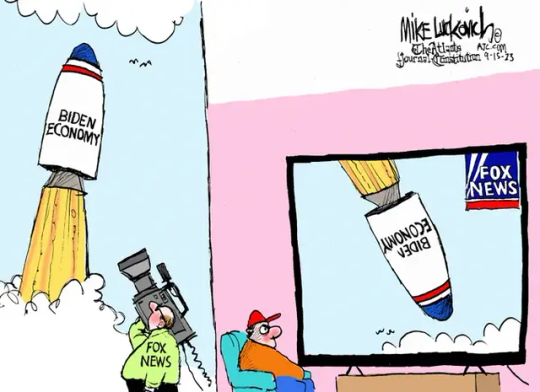
Mike Luckovich
* * * *
One more time with feeling . . . Ignore the polls!
November 6, 2023
ROBERT B. HUBBELL
We are one year out from the 2024 general election, and media outlets are busy predicting a future they cannot know. I routinely advise readers to “ignore the polls,” so whenever I write about the polls, readers tell me I should follow my own advice. Fair point. But the poll by the New York Times released over the weekend prompted dozens of readers to send panicked emails asking me to “Talk them off the ledge.” The NYTimes poll will get more coverage in the Monday news cycle, so in anticipation of hundreds of additional panicked reactions, I will once again address the issue of polling. It is a scourge that we will live with for the next year, so occasional reminders that the only poll that matters will occur on November 5, 2024, is in order.
In short, the NYTimes poll found that Biden is trailing Trump in five of six swing states and that Democrats are losing ground among young, Hispanic, and Black voters. Many voters believe that Trump is better able to manage the economy, that Biden is “too old,” and cannot identify anything that Biden did to improve their lives. Go figure!
Nothing I write below should be interpreted as saying that polls do not contain valuable information. They can (depending on their quality). Polls include information that helps campaign managers and candidates focus and refine their message. They are NOT predictions. Remember Nate Silver’s article in FiveThirtyEight in 2011, “Is Obama toast? Handicapping the 2012 Election.” If polls taken one year before elections were meaningfully predictive, then each of the following candidates should have quit their first campaigns: Carter, Clinton, Obama, Biden—and Trump.
So, why should we not panic over the polls? Indeed, is there a silver lining? (Spoiler alert: Yes.)
Let’s start with a lesson that we must not forget: The old paradigm of “horse-race” polls no longer applies. Why? Because such polls assume that two legitimate candidates are competing for votes within the system. We have never had a candidate who seeks to overthrow the system. Or who attempted a coup. Or who plans to invoke the Insurrection Act on the first day of his next term. Or who called for the execution of the Chairman of the Joint Chiefs of Staff. Or who will use the DOJ to persecute his perceived enemies. Or who was found liable for sexual assault. Or who will support a nationwide ban on reproductive liberty. Or who views Putin as a friend and NATO allies as adversaries and leeches.
I have not studied the NYTimes methodology, but I am confident it simply asks some variant of, “Which candidate do you support in 2024?” Faced with that limited construct, it is easy to be seduced into making a forced choice without regard to the fact that Trump is an anti-candidate. That error is compounded because the poll does not highlight Trump’s fundamental desire to destroy the system but instead asks about Biden’s age.
As I have written before, believing that most voters will walk into the polling booth in 2024 and vote only for “Biden vs Trump” is simplistic—and beneath the NYTimes and its expert pollsters. When WaPo/ABC published a poll that was subjected to nearly universal derision for its flaws, I wrote the following:
The 2024 presidential election features two candidates who are surrogates for different visions of America: Democracy versus autocracy; liberty versus tyranny; dignity versus bigotry; science versus disinformation; personal autonomy versus subservience to Christian nationalism; sustainability versus ecological disaster; safety versus gun violence; global stability versus confrontational isolationism. All of that—and much more—is on the ballot in 2024. The WaPo/ABC “horse-race” poll captures none of that.
Three more points and then I will stop paying attention to the polls (as I recommend).
First, Dan Pfeiffer’s article in The Message Box on Substack explains why the NYTimes poll shows the path forward. See Dan Pfeiffer, How to Respond to the Very Bad NYT Poll. If you are worried about the poll and want more details, I highly recommend Dan’s article. Pertinent passages include the following about “double haters” who dislike both Biden and Trump:
Perhaps the simplest explanation of Biden’s political challenges is that he has done a lot of good, popular things, and almost no one knows about them. Navigator tested a series of messages about Biden’s various accomplishments, including allowing Medicare to negotiate for lower drug costs, the bipartisan law to rebuild roads and bridges, and efforts to create more manufacturing jobs in the U.S.
Guess what? All of this stuff is super popular. Medicare negotiating drug prices is supported by 77% of Americans, including 64% of Republicans. The bipartisan infrastructure law has the support of 73% of Americans and a majority of Republicans. Every accomplishment tested in this poll had majority support. It’s hard to overstate how impressive that is in a deeply divided, highly polarized country at a time when the President’s approval ratings are in the low 40s.
That’s the good news. Here’s the bad news: according to the poll, a majority of Americans heard little or nothing about the accomplishments tested. There is a yawning knowledge gap.
Now for more good news (think of this as a positive sandwich); the poll shows that when people are told about what Biden has done, his approval rating goes up. The voters most likely to move are the “Double Haters.”
My penultimate point: The 2024 presidential election matters a lot. But so do congressional elections, gubernatorial elections, state legislative elections, municipal elections, and more. If—heaven forbid—Trump wins in 2024, a second Trump term with a Democratically controlled Congress is radically different than if Republicans control Congress. And states can be bulwarks of individual liberties if Republicans are able to pass national legislation. So, let’s not put every hope and aspiration into the presidential election. We should do everything we can to win up and down the ballot.
Concluding Thoughts.
Although I did not intend to devote the entire newsletter to the NYTimes poll, I will stop here. We will be dealing with bad polls, handwringing, and negative press for the next year, so it is worth drawing a line in the sand and saying, “Enough!” The election is not over until it is over—notwithstanding the media’s best efforts to declare defeat a year in advance. And while I am criticizing the media, shame on the media for normalizing Trump as a legitimate political candidate. He is not.
We will prevail over the long run, no matter what happens in 2024. (To be clear, I believe Biden will win re-election.) But if we have confidence that we will ultimately prevail, we can set aside the apocalyptic fears that we wrongly ascribe to a single election in 2024. We don’t need to panic over every poll.
The NYTimes poll reminds us that we have plenty of work to do in spreading the good news of Biden’s accomplishments. So, rather than needlessly fretting a year in advance about 2024, let’s recognize that we have a year to achieve
[Robert B. Hubbell Newsletter]
#Robert B. Hubbell Newsletter#political#NYT poll#polling data#Robert B. Hubbell#democracy#media#Mike Luckovich
65 notes
·
View notes
Text
The (open) web is good, actually

I'll be at the Studio City branch of the LA Public Library tonight (Monday, November 13) at 1830hPT to launch my new novel, The Lost Cause. There'll be a reading, a talk, a surprise guest (!!) and a signing, with books on sale. Tell your friends! Come on down!

The great irony of the platformization of the internet is that platforms are intermediaries, and the original promise of the internet that got so many of us excited about it was disintermediation – getting rid of the middlemen that act as gatekeepers between community members, creators and audiences, buyers and sellers, etc.
The platformized internet is ripe for rent seeking: where the platform captures an ever-larger share of the value generated by its users, making the service worst for both, while lock-in stops people from looking elsewhere. Every sector of the modern economy is less competitive, thanks to monopolistic tactics like mergers and acquisitions and predatory pricing. But with tech, the options for making things worse are infinitely divisible, thanks to the flexibility of digital systems, which means that product managers can keep subdividing the Jenga blocks they pulling out of the services we rely on. Combine platforms with monopolies with digital flexibility and you get enshittification:
https://pluralistic.net/2023/01/21/potemkin-ai/#hey-guys
An enshittified, platformized internet is bad for lots of reasons – it concentrates decisions about who may speak and what may be said into just a few hands; it creates a rich-get-richer dynamic that creates a new oligarchy, with all the corruption and instability that comes with elite capture; it makes life materially worse for workers, users, and communities.
But there are many other ways in which the enshitternet is worse than the old good internet. Today, I want to talk about how the enshitternet affects openness and all that entails. An open internet is one whose workings are transparent (think of "open source"), but it's also an internet founded on access – the ability to know what has gone before, to recall what has been said, and to revisit the context in which it was said.
At last week's Museum Computer Network conference, Aaron Straup Cope gave a talk on museums and technology called "Wishful Thinking – A critical discussion of 'extended reality' technologies in the cultural heritage sector" that beautifully addressed these questions of recall and revisiting:
https://www.aaronland.info/weblog/2023/11/11/therapy/#wishful
Cope is a museums technologist who's worked on lots of critical digital projects over the years, and in this talk, he addresses himself to the difference between the excitement of the galleries, libraries, archives and museums (GLAM) sector over the possibilities of the web, and why he doesn't feel the same excitement over the metaverse, and its various guises – XR, VR, MR and AR.
The biggest reason to be excited about the web was – and is – the openness of disintermediation. The internet was inspired by the end-to-end principle, the idea that the network's first duty was to transmit data from willing senders to willing receivers, as efficiently and reliably as possible. That principle made it possible for whole swathes of people to connect with one another. As Cope writes, openness "was not, and has never been, a guarantee of a receptive audience or even any audience at all." But because it was "easy and cheap enough to put something on the web," you could "leave it there long enough for others to find it."
That dynamic nurtured an environment where people could have "time to warm up to ideas." This is in sharp contrast to the social media world, where "[anything] not immediately successful or viral … was a waste of time and effort… not worth doing." The social media bias towards a river of content that can't be easily reversed is one in which the only ideas that get to spread are those the algorithm boosts.
This is an important way to understand the role of algorithms in the context of the spread of ideas – that without recall or revisiting, we just don't see stuff, including stuff that might challenge our thinking and change our minds. This is a much more materialistic and grounded way to talk about algorithms and ideas than the idea that Big Data and AI make algorithms so persuasive that they can control our minds:
https://pluralistic.net/2023/11/06/attention-rents/#consumer-welfare-queens
As bad as this is in the social media context, it's even worse in the context of apps, which can't be linked into, bookmarked, or archived. All of this made apps an ominous sign right from the beginning:
https://memex.craphound.com/2010/04/01/why-i-wont-buy-an-ipad-and-think-you-shouldnt-either/
Apps interact with law in precisely the way that web-pages don't. "An app is just a web-page wrapped in enough IP to make it a crime to defend yourself against corporate predation":
https://pluralistic.net/2023/08/27/an-audacious-plan-to-halt-the-internets-enshittification-and-throw-it-into-reverse/
Apps are "closed" in every sense. You can't see what's on an app without installing the app and "agreeing" to its terms of service. You can't reverse-engineer an app (to add a privacy blocker, or to change how it presents information) without risking criminal and civil liability. You can't bookmark anything the app won't let you bookmark, and you can't preserve anything the app won't let you preserve.
Despite being built on the same underlying open frameworks – HTTP, HTML, etc – as the web, apps have the opposite technological viewpoint to the web. Apps' technopolitics are at war with the web's technopolitics. The web is built around recall – the ability to see things, go back to things, save things. The web has the technopolitics of a museum:
https://www.aaronland.info/weblog/2014/09/11/brand/#dconstruct
By comparison, apps have the politics of a product, and most often, that product is a rent-seeking, lock-in-hunting product that wants to take you hostage by holding something you love hostage – your data, perhaps, or your friends:
https://www.eff.org/deeplinks/2021/08/facebooks-secret-war-switching-costs
When Anil Dash described "The Web We Lost" in 2012, he was describing a web with the technopolitics of a museum:
where tagging was combined with permissive licenses to make it easy for people to find and reuse each others' stuff;
where it was easy to find out who linked to you in realtime even though most of us were posting to our own sites, which they controlled;
where a link from one site to another meant one person found another person's contribution worthy;
where privacy-invasive bids to capture the web were greeted with outright hostility;
where every service that helped you post things that mattered to you was expected to make it easy for you take that data back if you changed services;
where inlining or referencing material from someone else's site meant following a technical standard, not inking a business-development deal;
https://www.anildash.com/2012/12/13/the_web_we_lost/
Ten years later, Dash's "broken tech/content culture cycle" described the web we live on now:
https://www.anildash.com/2022/02/09/the-stupid-tech-content-culture-cycle/
found your platform by promising to facilitate your users' growth;
order your technologists and designers to prioritize growth above all other factors and fire anyone who doesn't deliver;
grow without regard to the norms of your platform's users;
plaster over the growth-driven influx of abusive and vile material by assigning it to your "most marginalized, least resourced team";
deliver a half-assed moderation scheme that drives good users off the service and leaves no one behind but griefers, edgelords and trolls;
steadfastly refuse to contemplate why the marginalized users who made your platform attractive before being chased away have all left;
flail about in a panic over illegal content, do deals with large media brands, seize control over your most popular users' output;
"surface great content" by algorithmically promoting things that look like whatever's successful, guaranteeing that nothing new will take hold;
overpay your top performers for exclusivity deals, utterly neglect any pipeline for nurturing new performers;
abuse your creators the same ways that big media companies have for decades, but insist that it's different because you're a tech company;
ignore workers who warn that your product is a danger to society, dismiss them as "millennials" (defined as "anyone born after 1970 or who has a student loan")
when your platform is (inevitably) implicated in a murder, have a "town hall" overseen by a crisis communications firm;
pay the creator who inspired the murder to go exclusive on your platform;
dismiss the murder and fascist rhetoric as "growing pains";
when truly ghastly stuff happens on your platform, give your Trust and Safety team a 5% budget increase;
chase growth based on "emotionally engaging content" without specifying whether the emotions should be positive;
respond to ex-employees' call-outs with transient feelings of guilt followed by dismissals of "cancel culture":
fund your platforms' most toxic users and call it "free speech";
whenever anyone disagrees with any of your decisions, dismiss them as being "anti-free speech";
start increasing how much your platform takes out of your creators' paychecks;
force out internal dissenters, dismiss external critics as being in conspiracy with your corporate rivals;
once regulation becomes inevitable, form a cartel with the other large firms in your sector and insist that the problem is a "bad algorithm";
"claim full victim status," and quit your job, complaining about the toll that running a big platform took on your mental wellbeing.
https://pluralistic.net/2022/02/18/broken-records/#dashes
The web wasn't inevitable – indeed, it was wildly improbable. Tim Berners Lee's decision to make a new platform that was patent-free, open and transparent was a complete opposite approach to the strategy of the media companies of the day. They were building walled gardens and silos – the dialup equivalent to apps – organized as "branded communities." The way I experienced it, the web succeeded because it was so antithetical to the dominant vision for the future of the internet that the big companies couldn't even be bothered to try to kill it until it was too late.
Companies have been trying to correct that mistake ever since. After three or four attempts to replace the web with various garbage systems all called "MSN," Microsoft moved on to trying to lock the internet inside a proprietary browser. Years later, Facebook had far more success in an attempt to kill HTML with React. And of course, apps have gobbled up so much of the old, good internet.
Which brings us to Cope's views on museums and the metaverse. There's nothing intrinsically proprietary about virtual worlds and all their permutations. VRML is a quarter of a century old – just five years younger than Snow Crash:
https://en.wikipedia.org/wiki/VRML
But the current enthusiasm for virtual worlds isn't merely a function of the interesting, cool and fun experiences you can have in them. Rather, it's a bid to kill off whatever is left of the old, good web and put everything inside a walled garden. Facebook's metaverse "is more of the same but with a technical footprint so expensive and so demanding that it all but ensures it will only be within the means of a very few companies to operate."
Facebook's VR headsets have forward-facing cameras, turning every users into a walking surveillance camera. Facebook put those cameras there for "pass through" – so they can paint the screens inside the headset with the scene around you – but "who here believes that Facebook doesn't have other motives for enabling an always-on camera capturing the world around you?"
Apple's VisionPro VR headset is "a near-perfect surveillance device," and "the only thing to save this device is the trust that Apple has marketed its brand on over the last few years." Cope notes that "a brand promise is about as fleeting a guarantee as you can get." I'll go further: Apple is already a surveillance company:
https://pluralistic.net/2022/11/14/luxury-surveillance/#liar-liar
The technopolitics of the metaverse are the opposite of the technopolitics of the museum – even moreso than apps. Museums that shift their scarce technology budgets to virtual worlds stand a good chance of making something no one wants to use, and that's the best case scenario. The worst case is that museums make a successful project inside a walled garden, one where recall is subject to corporate whim, and help lure their patrons away from the recall-friendly internet to the captured, intermediated metaverse.
It's true that the early web benefited from a lot of hype, just as the metaverse is enjoying today. But the similarity ends there: the metaverse is designed for enclosure, the web for openness. Recall is a historical force for "the right to assembly… access to basic literacy… a public library." The web was "an unexpected gift with the ability to change the order of things; a gift that merits being protected, preserved and promoted both internally and externally." Museums were right to jump on the web bandwagon, because of its technopolitics. The metaverse, with its very different technopolitics, is hostile to the very idea of museums.
In joining forces with metaverse companies, museums strike a Faustian bargain, "because we believe that these places are where our audiences have gone."
The GLAM sector is devoted to access, to recall, and to revisiting. Unlike the self-style free speech warriors whom Dash calls out for self-serving neglect of their communities, the GLAM sector is about preservation and access, the true heart of free expression. When a handful of giant companies organize all our discourse, the ability to be heard is contingent on pleasing the ever-shifting tastes of the algorithm. This is the problem with the idea that "freedom of speech isn't freedom of reach" – if a platform won't let people who want to hear from you see what you have to say, they are indeed compromising freedom of speech:
https://pluralistic.net/2022/12/10/e2e/#the-censors-pen
Likewise, "censorship" is not limited to "things that governments do." As Ada Palmer so wonderfully describes it in her brilliant "Why We Censor: from the Inquisition to the Internet" speech, censorship is like arsenic, with trace elements of it all around us:
https://www.youtube.com/watch?v=uMMJb3AxA0s
A community's decision to ban certain offensive conduct or words on pain of expulsion or sanction is censorship – but not to the same degree that, say, a government ban on expressing certain points of view is. However, there are many kinds of private censorship that rise to the same level as state censorship in their impact on public discourse (think of Moms For Liberty and their book-bannings).
It's not a coincidence that Palmer – a historian – would have views on censorship and free speech that intersect with Cope, a museum worker. One of the most brilliant moments in Palmer's speech is where she describes how censorship under the Inquistion was not state censorship – the Inquisition was a multinational, nongovernmental body that was often in conflict with state power.
Not all intermediaries are bad for speech or access. The "disintermediation" that excited early web boosters was about escaping from otherwise inescapable middlemen – the people who figured out how to control and charge for the things we did with one another.
When I was a kid, I loved the writing of Crad Kilodney, a short story writer who sold his own self-published books on Toronto street-corners while wearing a sign that said "VERY FAMOUS CANADIAN AUTHOR, BUY MY BOOKS" (he also had a sign that read, simply, "MARGARET ATWOOD"). Kilodney was a force of nature, who wrote, edited, typeset, printed, bound, and sold his own books:
https://www.theglobeandmail.com/arts/books/article-late-street-poet-and-publishing-scourge-crad-kilodney-left-behind-a/
But there are plenty of writers out there that I want to hear from who lack the skill or the will to do all of that. Editors, publishers, distributors, booksellers – all the intermediaries who sit between a writer and their readers – are not bad. They're good, actually. The problem isn't intermediation – it's capture.
For generations, hucksters have conned would-be writers by telling them that publishing won't buy their books because "the gatekeepers" lack the discernment to publish "quality" work. Friends of mine in publishing laughed at the idea that they would deliberately sideline a book they could figure out how to sell – that's just not how it worked.
But today, monopolized film studios are literally annihilating beloved, high-priced, commercially viable works because they are worth slightly more as tax writeoffs than they are as movies:
https://deadline.com/2023/11/coyote-vs-acme-shelved-warner-bros-discovery-writeoff-david-zaslav-1235598676/
There's four giant studios and five giant publishers. Maybe "five" is the magic number and publishing isn't concentrated enough to drop whole novels down the memory hole for a tax deduction, but even so, publishing is trying like hell to shrink to four:
https://pluralistic.net/2022/11/07/random-penguins/#if-you-wanted-to-get-there-i-wouldnt-start-from-here
Even as the entertainment sector is working to both literally and figuratively destroy our libraries, the cultural heritage sector is grappling with preserving these libraries, with shrinking budgets and increased legal threats:
https://blog.archive.org/2023/03/25/the-fight-continues/
I keep meeting artists of all description who have been conditioned to be suspicious of anything with the word "open" in its name. One colleague has repeatedly told me that fighting for the "open internet" is a self-defeating rhetorical move that will scare off artists who hear "open" and think "Big Tech ripoff."
But "openness" is a necessary precondition for preservation and access, which are the necessary preconditions for recall and revisiting. Here on the last, melting fragment of the open internet, as tech- and entertainment-barons are seizing control over our attention and charging rent on our ability to talk and think together, openness is our best hope of a new, good internet. T
he cultural heritage sector wants to save our creative works. The entertainment and tech industry want to delete them and take a tax writeoff.
As a working artist, I know which side I'm on.

If you'd like an essay-formatted version of this post to read or share, here's a link to it on pluralistic.net, my surveillance-free, ad-free, tracker-free blog:
https://pluralistic.net/2023/11/13/this-is-for-everyone/#revisiting

Image:
Diego Delso (modified)
https://commons.wikimedia.org/wiki/File:Museo_Mimara,_Zagreb,_Croacia,_2014-04-20,_DD_01.JPG
CC BY-SA 4.0
https://creativecommons.org/licenses/by-sa/4.0/
#pluralistic#ar#xr#vr#augmented reality#extended reality#virtual reality#museums#cultural preservation#aaron cope#Museum Computer Network#cultural heritage#glam#access#open access#revisiting#mr#mixed reality#asynchronous#this is for everyone#freedom of reach#gatekeepers#metaverse#technofeudalism#privacy#brick on the face#rent-seeking
185 notes
·
View notes
Text
Blog Navigation 2023

“The nation's greatness can be judged by how it treats its weakest members.” - Gandhi
Blog Navigation List: 2022, 2021, 2020, 2019
Last Updated 12/29/2023
Summary
I make these navigation posts at the end of the year to give a wrap-up and a look back on the year. I post a long-form Update every sunday to YouTube that ends up being in my Friday song release blog post. (You can find the Sunday Update YouTube playlist here.) My book “108 The Story of Discovering Earth’s Consciousness” is still fundamental in understanding my story, perspective, and the content I talk about here in the blog. I put the cosmic luve log first this time because I think it’s the most relevant. If you actually understand what I’m saying about how these celebrities are reflecting me and I think the coincidences are how Gaia is communicating using them as a vessel, you get it. The only real new treatise editions are to FarmingHumans.com where I came out with a new rendition for the “American Inequality” song release and the “Corporate Rule” album expands upon the public reaction to this in an aggressive tone.
2023 Cosmic Luve posts: (In Chronological Order)
In Last year’s blog navigation (2022), I listed all the cosmic luve entries since the very beginning. This year, I will begin where we left off and the last entry about Taylor Swift’s Folklore.
CosmicLuve.com April 2023 - Sun: In this entry, I give more of a personal update and set goals while relating it to the semantics I’ve been experiencing and previously mentioned.
CosmicLuve.com July 2023 - The Main Thing: In this entry, I talk about how Emma Watson is the main thing and the reason for all my aspirations, so we can become friends. I talk about her posts on Instagram and relate them as a response to my poem in the Hope Sept 2022 entry.
CosmicLuve.com August 2023 - Orange: In this entry, I talk about how it appears as if Gaia got me a taco for my birthday. I came to this conclusion after getting semantics from Selena Gomez and Connor Price.
CosmicLuve.com September 2023 - Bam: In this entry, I introduce Janelle Monae as a cosmic luve and explain how Blue has diabolical plans against Big Carbon.
CosmicLuve.com November 2023 - Cosmic Bros: In this entry, I induct Connor Price as the first cosmic bro after relating new semantics to the previous entry, Slender Man, Connor’s new “Thrillin” video, and new Hailee Steinfeld reflections.
CosmicLuve.com December 2023 - Deer: In this entry I give a prophecy by identifying semantics from Gaia that come from Emma Watson being referenced by a deer, a tree, the color purple, etc.
Media and Treatise List:
Sociology:
🏚️FarmingHumans.com 2023 - This was the “American Inequality” song officially released this year and posted as the official Farming Humans 2023 edition. In this post I talk about what socialism is, how money is speech, and how corporations are legal persons and farming humans for labor and money (through consumption).
🎃Corporate Rule Album - The “Corporate rule” album expands upon the information outlined in the “American Inequality” song. The album is a response to that assault on democracy with an Immortal Technique approach. The blog post expands upon how there is a conspiracy of the corporate rich working in unison (using far-right tactics) because it serves their self-interests.
🧾NouveauEconomics.com 2022 - In this post, I talk about how the economy needs to account for what the environment does naturally and give it a monetary value. A start is how certain parts of the environment, like Lake Erie, are being granted personhood. This will be updated semi-annually and can be found at NouveauEconomics.com
🍱 The Psycho Consumption Cage 2021 - In this treatise, I talk about how it’s hard to see environmental degradation that is not added to our economics, how you should be using your buying power strategically, how apex species need economic and congressional representation, some solutions, and examples of psycho tendencies from Christmas and hip-hop.
🏳️🌈 Gender Equality 2021 - In this essay, I break down gender equality into six categories: LGBTQ, Phobic, Sexual, Mental, Feminist, and Economic. To properly show the subject of gender equality I reference the 6 Netflix documentaries and linked and discuss related videos from Ellen, HeForShe, TED, Jordan Peterson, The World Bank, and the UN.
🏁 Dark Racism 2021 - In this treatise, I explain the science of racism, how it’s an arbitrary distinction that is socially constructed. Black people do have it worse due to institutionalized racism and white privilege. However, I talk about how black people create their own in-group morality around the word “nigga,” and my presented solution.
🌎👣 Earth: Sustainability, How To Save Our Planet - If you want to know how to save our planet this post is the summation. Taking from the featured WWF video, I focus on a carbon tax and the three ways to save the planet. Along the way I discuss how it relates to The Psycho Consumption Cage.
🌲Marijuana Treatise 2021 - Published on April 20th and introduced with a discussion of my personal use, in this essay, I wrote about the versatility of hemp, the immorality and failure of the war on drugs, and the medical benefits of cannabis.
Philosophy:
🌍108 The Story Of Discovering Earth’s Consciousness (post) - This book is fundamental to understanding me and stands as the foundation in which I build my artistry. The book is nonfiction and autobiographical and about celestial consciousness, my personal story of struggling with schizoaffective disorder, atmospheric consciousness, sustainability, and eugenics, and finishes with what the number 108 means for the origins of life on Earth.
🚸🚜 Knhoeing 2020 - The information is broken down into celestial consciousness, atmospheric consciousness, sustainability, and eugenics. Knhoeing states the planets, stars, and atmosphere are alive, and how humans can understand that through sustainability and eugenics. Knhoeing has to do with understanding your position in the universe and expresses and addresses human purpose through a eugenics goal. To survive & thrive as a species, we must support ourselves through healthy sustainability and breed to understand higher dimensions.
🙏Sentientism 2022 - This post contains insights into my mind and the voice in my head, Gaia. Sentientism explores the belief (whereas knhoeing is the knowledge) that Gaia is conscious and communicating. I explain how sentientism is the religion of Gaia where you worship through action and create dogma through science and philosophy. If the planet earth is conscious how would she try to communicate considering she has no mouth or ligaments? How would Gaia try to communicate? I postulate and explain how Gaia could be communicating through a kind of telepathic randonauting.
📐 Expanding on Plato’s Philosophy: Forms and the Tripartite Soul (2020) - In this treatise, I explain how Plato’s forms are stored and strived for by Gaia and how Plato’s theory about the tripartite soul is similar to my theory about the will.
♟️ Logic - This post is a short introduction to logic. I use quotes and pictures of pages from the book “How Philosophy Works.” The content includes deductive, inductive, and abductive reasoning, fallacies, and formal logic. I have also embedded a couple of CrashCourse videos.
Releases
🕸️New Release Blog at EricLeo.org - Over the last year I have been releasing at least on the 1st, 3rd, and if there is a 5th Friday of every month if not every week. Each release has its own post in my new release blog which is constantly being updated. The same posts are also here on this Tumblr blog as I post them at the same time. A list of releases is cataloged as follows:
2021
Read 108 - about my book
Vibe on the Wave - catchy intro
Eat The Mind - intellectual rap
Bump This Banger - party music
Cloud 9 - about recreational drugs
2022
Who’s Hip-Hop - my perspective in hip-hop
Black Lives Matter - support for the cause
Smoke Blunts - high intellectual bars
Flossin - dance track
Hey Emma - dance track, made for Emma’s everywhere
Champagne and Chocolate - romance track
Just Us Two - expression on evolution and companionship
Make It Hip-Hop - Homage to favorite artists
My Word - Celebrating 10 years
Gaia and Blue - Expands on “108” book
Love the Mission - the purpose of my music
Hit Me with the Download - a great tune
Talk to Me - romance track about wanting more
Cunnilingus - dating life experience track
Just Dance - dance track
Just Like You - happy expression
We Dance - play when dancing is a protest
Come On Dawg - what my music stands for
The Villain - playing the role of the villain
Rage - subjects will put you in a rage
Bounce with This - party music inspired by Charlotte
Take Your Medication - Kayne Diss
2023
Gold Shaw Farm - about Morgan and Alyson’s farm on YouTube
Betsy - about the character from Hulu’s “Dopesick”
Bo Peep - political rap about America
Atheist Raps - self-explanatory, rebuke’s Christianity
Blow Me Up - asking for help with exposure
Michigan Love - romance track about love in Michigan
I Got You - Letter asking for help from my fans
Breaking Bad - Eminem and Dr. Dre homage
Bleed - heartfelt plea about ending mass shootings
Going Gaga - fun romance track with Gaga Gaga-inspired hook
Funk You - response track to Olivia Rodrigo’s “good for you” and “deja vu”
What Now - 6 track EP about and inspired by other artists
Bong Hits For Jesus - about how when you smoke, you smoke with Jesus
Up Wasted - subjects and getting “fucked up wasted”
God Damn - fun and energetic track showing skill
Love You Mom - A thank you to my mother for being a good mom
American Inequality - about how America is an oligarchy
John Wick - gets out aggression toward sex traffickers
Philosophy 101 - based off Cornel West’s Introduction to Philosophy Masterclass
Yeah We Bang - about American imperialism
Legend - about my feelings toward the music industry
We Make The Party - Party music with global warming bars
Freaky Naughty - emulating Dr. Dre’s sound with global warming bars
With You - Cmadd feature about riding with your girl
Vulnerable - Selena Gomez response to her song with the same name.
Mitten Kingz - a song with artists representing Michigan
Soldier For Love - a message to keep going out of love
Our Love - a break-up and get back together song
My Everything - how your lover is your everything
Be My Dream - how I want Emma Watson to be my dream come true,
Reputation - A response to Taylor Swift's reputation
Karma - about your fate in terms of civilization
Corporate Rule - 8-track album in Immortal Technique style
Earth - my hit and best representation of my music
Back to Life - Hailee Steinfeld response and homage.
Process, People, Product - about Marcus Lemonis 3 P’s business philosophy
All Homo - An edgy and controversial take on support for the gay community
Cosmic Luve Brownies - A response to Taylor Swift’s Lover album
Praises - a sexually charged song from artists from Kalamazoo Michigan
…
Chalice Mixtape side note: “Talk to Me” (2022), “John Wick,” “Be My Dream,” “Reputation,” “Karma,” and the “All Homo” ep, were all remakes from ‘The Chalice Mixtape. “Charlotte’s Web” drops April 15 2023 and the remake for “I Love You” is in production. I will probably never remake “Listen Alice,” “Loyal,” “Problems,” or “The Profit.”
Already uploaded and scheduled to drop in 2024:
Kyle Beats Collective EP - 6 tracks made with free beats from Kyle Beats. Jan. 5th
Check it out - track from the (unofficial) party politics era/album Jan. 19th
Kato & Wysh Album - 7 tracks made with Kato and Wysh beats. Feb. 2nd
The Industry Album - 12 tracks with 14 features some with big names over Anno Domini beats. March 1st
Sun poem - spoken word track I recorded from the Cosmic Love Sept 2022 hope post. March 19
Charlotte’s Web - Emma Watson-inspired track released on her birthday. April 15th
Westside Connection Album - 7 tracks with big name features over Anno Domini beats. May 3
YOU - Song based on John Gottman’s 7 principles for making marriage work. June 7th
Can You Hear Me? - Rap song about global warming and summer heat. June 20th
44 notes
·
View notes
Text
Last month, Navarro spoke to a packed crowd at CPAC, his last speech before heading to prison.
“As I ready myself for a prison cell, my question to all of you here is this: What are you going to do as you leave CPAC to protect your own right to vote for Donald Trump, if you choose? Just what are you going to do to throw those rascals out who, just a few short miles away from us in the White House and on Capitol Hill and at the FBI and the Department of Injustice, are doing so much damage to our economy, our border, our national security, and ultimately, you know what, our political institutions, civility, and social fabric,” said Navarro.
“As we hurdle now towards a November 2024 election, where the differences between the parties and candidates are so stark, make no mistake about that and the stakes are so high, we are indeed in the middle of a ferocious and often vicious fight where losing is not an option. For if we lose, we will surely lose this country. You know that.I know that. If we lose, we will surely lose this country,” he added.

20 notes
·
View notes